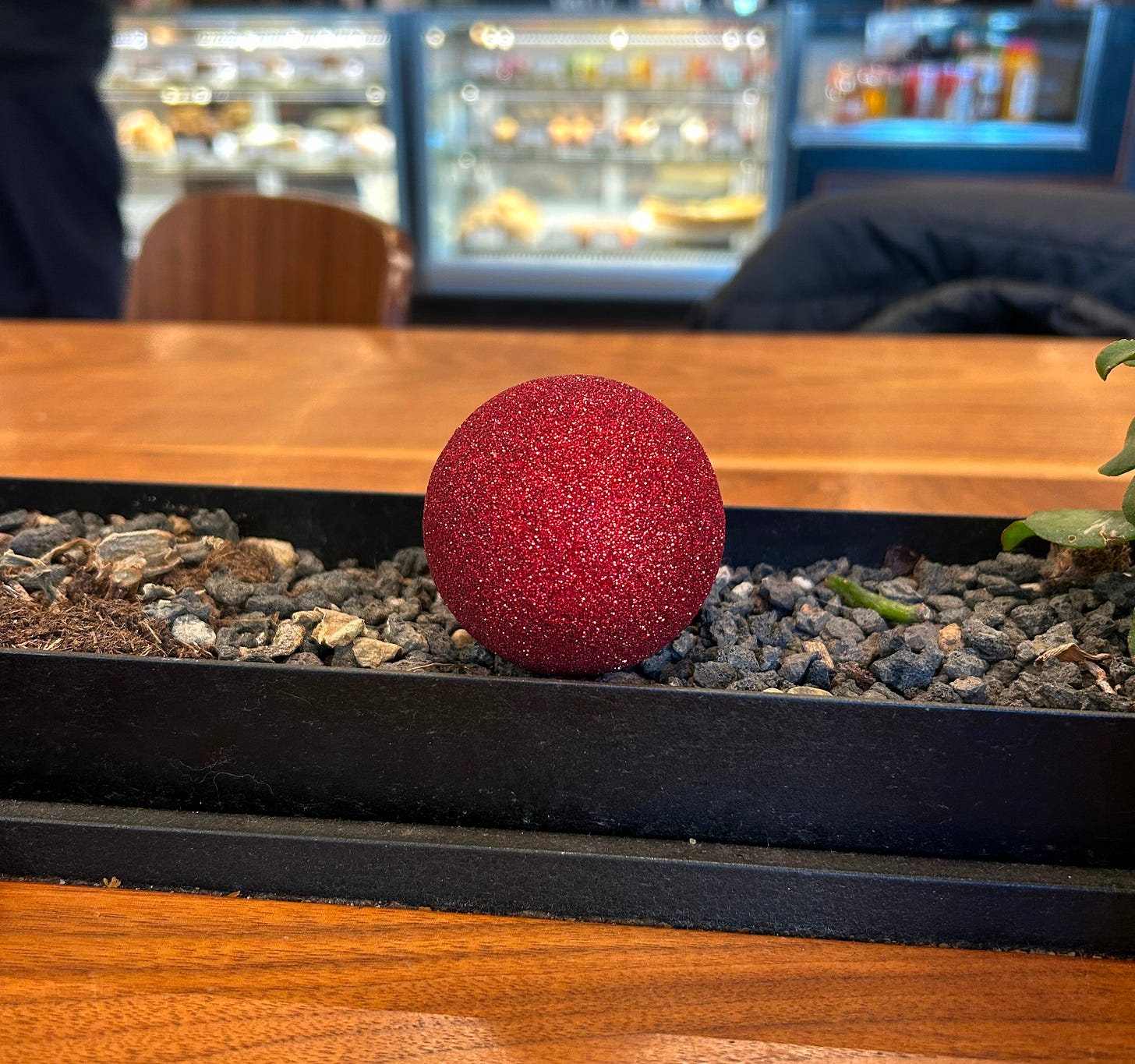It is, once more, that time of the year.
On the wooden table before me, which is thin and long, as though it was made for a tapas feast, there runs down the middle a gravel median sprouting, through all the year, a variety of succulents.
Now sitting betwixt these many plants—though I’m no longer so sure they’re made of cells—are an assortment of red Christmas ornaments.
Oh yes, it is that time.
Something about the periodic yet piercingly pervasive red, green, and white of Yuletide lifts from my shoulders the weight of this now more barren earth. Perhaps it is for this reason the holidays transpire in colder months.
We must look forward.
Last weekend—which really started on what is now formally called (though it’s not so formal an occasion) Blackout Wednesday—was quite fine. I saw friends and family and lived more slowly and gratefully.
So much love, so many deeply rooted ties.
No matter how far and long I travel, home, like the Prodigal son’s father, always welcomes me back with open arms. Material is rearranged by Time, but true connection is immaterial and therefore immune to the momentous blade of this dimension.
The holidays are, indeed, a special time . . . A ceremonial trek from the village routine up into the holy clouded mountains, closer to the heavens. A leaving behind of our worldly obligations in a seasonal effort to reconnect with the supernatural. A most magical coming together in the name of celebration.
It seems, however, we’ve forgotten why. It seems, if I’m being honest, we trek mindlessly. It seems, when I slow down and observe, we are not trekking, but racing.
The holidays have come to be just one more thing we must get done. And, after all, why wouldn’t they be?
Having built ourselves into a box, thinking it would save us, we‘ve severed ourselves from nature, from our origin. In the wrongfully righteous name of science, we now lie distant from all that gives and given ourselves to all that takes, convinced, by a show of grandiosity, that it takes for our good . . . Perhaps the greatest heist of all time.
Is it any wonder we’ve forgotten why?
Every culture has and needs a time dedicated to celebration. As human beings, we are bound to forget, to take for granted those things to which we grow accustomed.
But what happens when we grow accustomed to celebration?
I grow more peaceful every day. It is that sort of peace that makes you anxious since you suspect that chaos lurks. If I try too hard, my emotions may undulate rapidly and drastically, like deep water waves in cliff-lined coastal waters, crashing violently against the rocky shore, shooting upwards into the sight of earthly onlookers its lively liquid.
Perhaps I’ve had too much caffeine.
Or maybe this is why people nurtured in chaos voluntarily blow things up in times of peace . . . Since the calm is more foreign than war, and we all far prefer the familiar.
I do sometimes become anxious in silence, in stillness. Mostly due to my thoughts. Thinking—as opposed to feeling—I find, is almost always an utter waste of time. Maybe that’s why I like to write so much. It’s certainly why I like to do so much. Movement tempers my thoughts. Writing directs, or channels them.
You know, I don’t really mind silence, actually. I suppose what it is that I don’t like is the aimlessness and subsequent indulgence that tends to accompany a lack of stimulation. Disorder. That’s what it is. I do not, as certain others seem to, thrive in chaos.
It is, of course, all within. But it is affected by all without. It is changed, improved, or fueled by the choices we make. By what we do with our hands.
My mind fluctuates between either side of this Yin-yang according to where on the spectrum between clarity and obscurity I sit. When things don’t make sense, when there is some sort of jam, when the stars seem not to align, I become anxious and desperate.
I suppose I believe I can, by taking action, manually realign them. But in truth, all I can do is let go, ride the world round, and wait for the clouds to clear. They clear faster when I don’t focus so hard on their presence.
Learned helplessness carries a negative connotation. But that is because Seligman is a Westerner.
I was walking Tanner, the dog, yesterday when I looked up into the sunny sky and wondered what might happen—or, really, how I might feel for the seconds or minutes I’d have left if the sun were to explode. Such a thought might have once sent me into a panic, but I marveled in that moment. Life is so great! How quickly all that is could cease to be . . . How delicate and magnificent this thing is . . . And how strange it is we’ve all come to invest our minds, bodies, and spirits in these trifles!
Surely, the destruction of nature and, particularly, the shading of the stars—this “light pollution”—is the devil’s effort to spread ignorance, to render us unaware of our insignificance. Pomposity is the word. How clearly we’d see if there weren’t so much light!
In Pilgrim at Tinker Creek, Annie Dillard says, “If we are blinded by darkness, we are also blinded by light. When too much light falls on everything, a special terror results.”
We are made to think we must “become.” As if we are not!
Keep reading with a 7-day free trial
Subscribe to Ryan's Substack to keep reading this post and get 7 days of free access to the full post archives.




